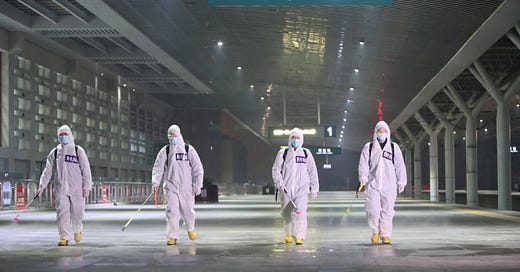A Premature Pandemic Postmortem
What Michael Bloomberg and the WHO’s Tedros conspicuously leave out of their review of what went right and wrong.

Over at Bloomberg Opinion, the director-general of the World Health Organization, Tedros Adhanom Ghebreyesus, and former New York City mayor (and presidential hopeful) Michael Bloomberg offer their version of ‘lessons learned’ from COVID-19 for the next pandemic.
Let us set aside the obvious objection—that the rush to a postmortem seems premature when the world continues to see over 500,000 new cases and more than 10,000 deaths every day. Tedros and Bloomberg’s essay is as interesting for what it conveniently leaves out as it is for its largely anodyne recommendations targeted at scientists and policymakers.
Specifically, the article is silent on how the actions of the Chinese regime (a “responsive” government relying on “the will of the majority of its people,” as Bloomberg once argued) contributed to worsening the pandemic. Neither does the article touch on the flaws of the organization that Tedros directs. And, finally, it does not consider how some habits of the expert class might have fueled the “mis- and dis-information around all aspects of the virus,” which Tedros and Bloomberg are rightly concerned about.
Here are some of the lessons that Tedros and Bloomberg may consider including in a future version of their opinion piece:
Do not trust autocrats. China’s negligence and deliberate downplaying of the dangers of the virus were critical to its early global spread. Before his death, Li Wenliang, the ophthalmologist-turned-whistleblower at Wuhan Central Hospital, was being investigated by the Chinese police for “severely disturbing social order” and “spreading rumors.” After researchers at the Shanghai Public Health Clinical Center sequenced the virus’s genome, the facility was ordered to close for “rectification.” Statistics on cremations from Wuhan suggest that Chinese authorities underreported COVID-related deaths by a factor of 10, and the British government reportedly estimated that the case numbers were 15 to 40 times higher than those disclosed by the Chinese government.
We need a better global health body. . . The pandemic is bound to leave the World Health Organization’s reputation in tatters. For political reasons, the organization took information provided by the Chinese regime at face value, while ignoring the early warnings coming from Taiwan. Two weeks after Taiwanese authorities alerted the WHO of the possibility of human-to-human transmission on December 31, 2019, the WHO still repeated the Chinese lie that there was no such indication. As late as on February 24, 2020, the WHO claimed that the world was “not witnessing the uncontained global spread of this virus, and we are not witnessing large-scale severe disease or death.”
. . . not led by a mediocrity. It is no surprise that for some WHO officials it seemed impossible to even acknowledge Taiwan’s existence, much less take it seriously as one of the most effective early responders to the virus. Tedros himself has been a symptom of the WHO’s politicized nature and its capture by China. Like his predecessor, Margaret Chan, he was elected to his position in 2017 with the help of China and without the votes of Western democracies. As Ethiopia’s former health minister, his main qualifications included covering up for three cholera outbreaks in the country.
Competence and speed trumps coordination. As Tedros and Bloomberg note, the pandemic underlines the need for better global surveillance of emerging threats and for more effective international coordination. But the catastrophically bad vaccine rollout in the European Union demonstrates that efforts at coordination are no substitute for competent and rapid action. Bad policy and misaligned incentives do not become any better just because they are “coordinated” or delegated to an international body.
And enough of the lies, including noble ones. In fairness to Tedros, China, and the WHO, few public health voices and organizations have covered themselves in glory during the pandemic. In the early months of 2020, most cognoscenti asserted that the seasonal flu was a much bigger problem than COVID-19. “Everyone in America should take a very big breath, slow down and stop panicking and being hysterical,” former health advisor to president Barack Obama, Ezekiel Emanuel, said. On Chinese New Year, the chairman of the NYC city council’s health committee approvingly tweeted pictures of crowds celebrating in a “powerful show of defiance of coronavirus scare,” adding that “if you are staying away, you are missing out!” In early March, U.S. Surgeon General Jerome Adams and Dr. Anthony Fauci both suggested that facemasks were not effective in stopping the spread—a distortion that seems to have been motivated by a fear of panic-buying among the public creating shortages for health care workers. The CDC’s guidance on facemasks was not updated until April 3 (in the case of WHO, not until June 5). And when mass protests against the killings of George Floyd and Breonna Taylor broke out, various public health authorities set aside the “flatten the curve” imperative in the name of the fight against racism. “We do not condemn these gatherings as risky for COVID-19 transmission,” as an open letter signed by hundreds of public health experts put it. “We support them as vital to the national public health.”
Much has been written, correctly, about the irresponsible reactions of populists to the pandemic, including former president Donald Trump, whose failures of leadership were legion. Yet not all blame for the catastrophic nature of the ongoing pandemic can be placed on the doorstep of charlatans and simpletons and Trump. The crisis was also worsened by the failure of leading expert voices, and of the world’s main public health body, to get on top of the pandemic’s early spread. In that failure, one of the two authors of the Bloomberg Opinion piece carries a significant degree of responsibility. Before offering advice, acknowledging one’s responsibility and blind spots would be in order.




